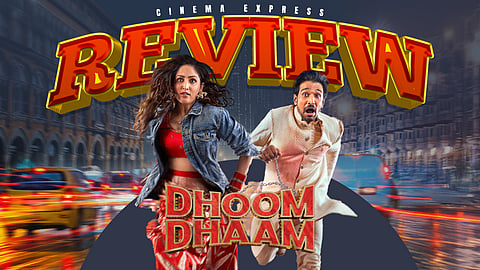

She is the rowdy kind; he is the soft and shy type. She drinks liquor, beats up goons and lies to her parents while he is fearful, timid and has never been with a girl before. His name is Veer (Pratik Gandhi) but he lacks valour, her name is Koyal (Yami Gautam) but she only understands the melody of cuss words. Rishab Seth’s Dhoom Dhaam builds on some of the obvious reversals of stereotypical gender traits. It is a tricky switch for how it is rooted in skewed gender dynamics. The idea of a ‘strong female character’ becomes quite literal. As it happens, the film is written by a bunch of men.
Starring: Pratik Gandhi, Yami Gautam, Pavitra Sarkar, Eijaz Khan, Kavin Dave, Mukul Chadda and Anand Vikas Potdukhe
Director: Rishab Seth
Streamer: Netflix
Koyal’s ‘rebellion’ is restricted to just aping some of the otherwise problematic aspects seen usually in alpha males. In a scene, she starts to violently beat up her ‘best friend’ when she reveals to be close to one of Koyal’s exes. It is intended to be funny but has no rhythm. Veer, on the other hand, easily gets emasculated; he is the be-sahara and abla mard. The two get hitched in an arranged marriage, meeting with their parents when they see each other for the first time. There, her parents sing praises of how she adheres to all rules and gets back home before seven; that she wakes up early in the morning to do pooja and yoga with a focus on breath work every alternate day. Whereas his parents exaggerate his non-existent physical strength. In short, he is ‘man’ enough, and she is ‘woman’ enough, to marry each other.
That’s clearly not the case, as it becomes apparent on their wedding night when two goons land up at their hotel room, demanding to know about a certain ‘Charlie’. As Veer crumbles with fear, Koyal takes centre stage to fight back. Seeing her real side, Veer confronts Koyal for lying to him earlier. Her extended reaction cum rant doesn’t feel authentic as she explains the painful experience of being a woman in the country. It seems as if the character is stuffed with heavy words that don’t ring true even if they carry the right sentiment. A sense of randomness ensues, making the exchange seem misplaced altogether, lacking a steady buildup or a fruitful release.
It also feels like a heavy disjoint from the tone of the film, which is essentially a comedy of errors. Functioning on a paper-thin plot, it takes place in the course of a night where Veer and Koyal have to find a bag which contains an important object that is being sought by a bunch of rogue police officers. This is a fairly simplistic story to mount a film that runs for close to two hours. Even the scenes don’t have a sense of spark in them; they stay largely banal and unfunny. Writers Aarsh Vora, Aditya Dhar and Rishab lack sensitivity in their gaze, leading to characters that don’t rise beyond their external offerings.
In a scene, Veer talks of wanting to let go of his multiple fears and phobias. And so, in order to liberate him, Koyal motivates him to be a stripper for a crowd of women in a nightclub. Making lewd demands, the ladies act more like dirty-eyed, beer-sloshed men. They grope him when he gets off the stage and mingles with them, tearing away his clothes. The scene is played for laughs but becomes grossly uncomfortable instead. There’s no thoughtful subversion and entertaining reinvention. Reversing the gender and retaining the ghastly bits won’t solve the problem. Gender equality goes beyond.
Pratik and Yami make up for an interesting pair, but the novelty of their dynamics is rather short-lived. There is little to root for them and more to just follow along without a lot of involvement. Pratik inhabits the vulnerabilities of a sensitive man quite well, but it mostly feels like an extension of his characters from Madgaon Express and Do Aur Do Pyaar from last year. His capabilities are more, but there isn’t enough written material for him to go on an exploration. Yami’s no-nonsense demeanour becomes repetitive too much before the film reaches an utterly substandard climax. There are no highs, no lows; just clumsily getting it all done with a rousing monotony. Ultimately, it’s the soft hero who saves the fighter damsel in distress from the clutches of the baddies. Much ado about nothing.